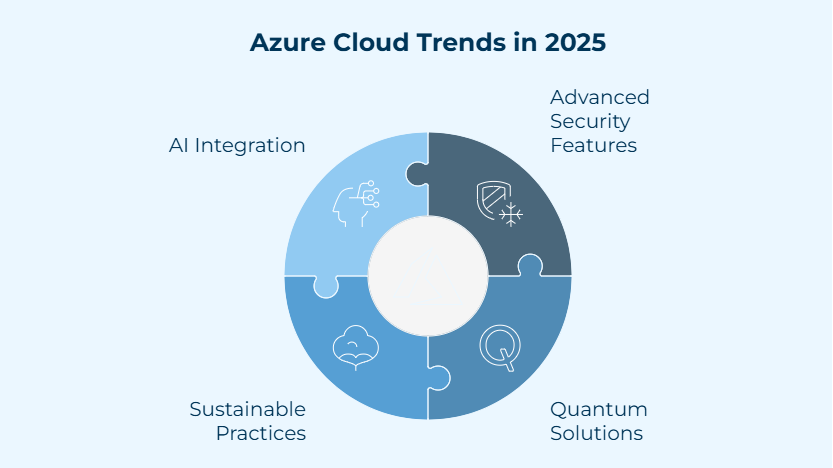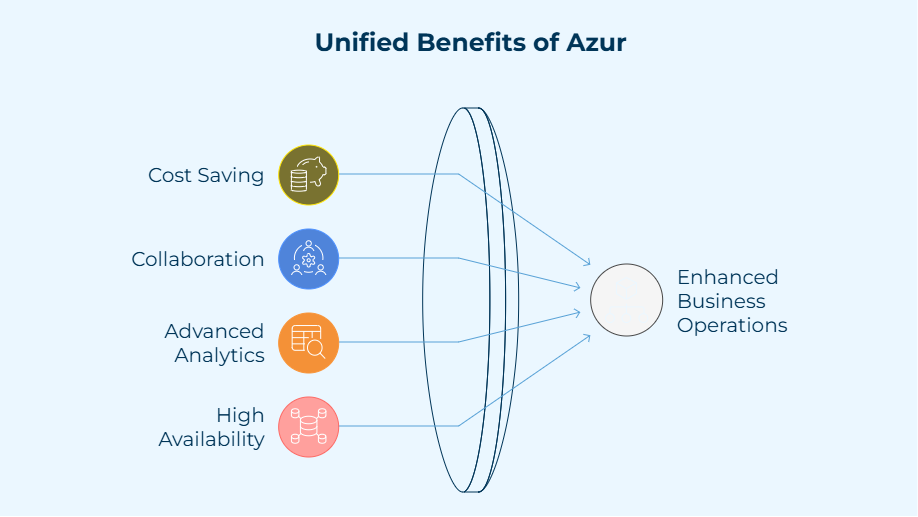Why Would You Choose Microsoft Azure Cloud for Your Business?

In this digitally reforming era, organizations are looking forward to a more sustainable and reliable approach for steady business growth. Microsoft Azure Cloud is becoming their premium choice, for that matter.
Cloud computing encourages collaboration, enhances mobility, enables flexibility, and helps in disaster recovery. Thus, leading to a massive switch towards cloud service providers (CSPs) without a second thought. However, CSPs are flooded in the market, and it becomes difficult to find the right one.
In this blog, let us discuss why you chose Microsoft Azure for your business and how it helps your business operate better.
Grow Smarter with Azure
Table of Contents
What is Microsoft Azure?
Microsoft Azure is a public cloud computing platform as well as an online portal for services like storage, analysis, networking, virtual computing, and others.
Using Azure tools and assets, you might change and store your information depending on your needs. It is capable of replacing any supplement on your on-premises server.
Azure might seamlessly enhance or substitute your local infrastructure. In this blog, we will discuss why you should choose Microsoft Azure Cloud for your business.
What Solutions Does Microsoft Azure Provide?
Microsoft Azure Cloud is one of the leading cloud computing platforms that provides a variety of solutions, helping businesses of all sizes work smarter, move faster, and scale effectively. It mainly provides three types of solutions, which include:
Infrastructure as a Service
The fundamental building blocks of cloud IT come from infrastructure as a service (IaaS). It allows virtualized tools for storage, servers, and networking. Users may rent these resources on demand rather than purchasing the actual hardware.
Businesses looking to save the expense and complexity of running physical servers will find this strategy flexible and scalable.
Platform as a Service
It offers infrastructure along with development tools, database management systems, and other services required to create and implement applications.
Developers can concentrate on their work without thinking about running systems or server management. For developers looking to rapidly and effectively construct apps, PaaS is ideal.
Software as a Service
It is a subscription-based online delivery of software applications. One can access the program from a web browser without installing or maintaining anything.
Typical instances are Zoom, Gmail, and Microsoft 365. Particularly for companies trying to save IT burden and expenses, SaaS is easy and practical.
IaaS basically provides raw infrastructure, PaaS provides a framework for building on, and SaaS provides ready-to-use software. These cloud models enable companies to work faster and more wisely.
Popular Microsoft Azure Cloud Trends in 2025

In 2025, you can see key innovations in Azure quantum computing, security, AI, sustainability, and hybrid cloud shaping trends. Some of the essential Microsoft Azure cloud trends are as follows:
- Azure is pushing limits with quantum solutions, hoping to address issues that are too complicated for conventional computation.
- Advanced security features and artificial intelligence-based monitoring improve protection and enable companies to satisfy changing compliance demands.
- Artificial intelligence is being extensively included in Azure’s platform to enable scale-based, smarter systems and automation.
- Microsoft is making sustainable practices a priority, along with energy-efficient infrastructure and carbon-conscious services.
- With tools like Azure Arc and Stack, companies can run and control resources uniformly across cloud, edge, and on-site settings.
Why Would You Choose Microsoft Azure Cloud for Your Business?
You can easily reduce costs and boost your productivity simultaneously with the help of Azure’s global infrastructure and its hybrid service.
It replaces your current on-premises data centers with Microsoft Azure Cloud backup services and Virtual Machines, making it a more cost-effective option for your business:
Infrastructure Management
Microsoft Azure cloud infrastructure delivers a range of advantages to organizations, especially when combined with Azure pipelines, facilitating streamlined automation and deployment processes.
It further offers one of the best IaaS, which enables companies to get cloud computing services on a pay-as-you-go basis.
Disaster Recovery
The backup and recovery services are among the top abilities of Microsoft Azure Cloud. It is flexible and can be used in any operating system, language, and location.
You can easily recover data via disaster recovery as a service as well, and you can limit the scheduled backup and its frequency.
Hybrid Cloud Model
If you are planning to migrate to the cloud, you can easily do that with the Azure Hybrid Cloud model. These models enable you to surpass complexities and upgrade resources.
It successfully keeps your on-premises data intact while allowing you an easy cloud migration.
Adaptable and Scalable
Microsoft Azure Cloud is widely popular due to its scalable capabilities. The Azure Data Platform allows utmost adaptability and flexibility. Thus, making it easy to scale capabilities according to the business needs.
Readily Available
Microsoft Azure Cloud services are available to its users across the globe. Many data centers are situated across the globe, so Azure is the ideal choice for businesses that wish to migrate their apps and data wherever they want.
Integration with Other Microsoft Tools
Various organizations are dependent on Azure to seamlessly integrate with Microsoft products. There is no other cloud provider that consolidates active directory management and extends the domain controller the way Azure does.
Assessment Capabilities
You can access the correct information with the help of cloud computing. Azure offers functionality for trusted user authentication and credential control. Companies can use these to minimize identity management expenditure and be even more reliable.
Host and Develop Mobile and Web Apps
One of the major reasons why Azure is considered the best is that it can develop and host mobile and web apps both. It makes the app flexible and autonomous for autoscaling, integrating on-premises apps, and patch management.
Accelerate Growth with Azure
What are the Benefits of Choosing Azure?

Microsoft Azure Cloud provides massive benefits to businesses of various sizes and across various sectors. Given below are some of the most essential benefits of adopting Azure:
Cost Saving
Azure offers functionality for trusted user authentication and credential control. Therefore, it saves the upfront costs usually associated with building physical infrastructure.
The software also provides tools to help monitor, control, and maximize expenditure, thus enabling simpler budget adherence. Companies who already use Microsoft products can benefit from licensing options like the Azure Hybrid Benefit to help further reduce cloud expenditure.
Collaboration
Through close connection with Microsoft 365 products, including Teams, SharePoint, and OneDrive, Azure improves workplace collaboration.
These tools let teams easily share files, simultaneously edit documents, and interact from different locations. It also offers remote application and data access, hence increasing output for hybrid or scattered teams.
Integrated solutions like Azure DevOps and GitHub allow developers and IT experts to simplify their processes.
Advanced Analytics
Azure Cloud’s powerful insights platform assists businesses to obtain a deep comprehension of their information.
Services include Azure Synapse Analytics, Data Lake Storage, and Power BI, which allow companies to effectively process, examine, and visualize vast amounts of data.
More precise forecasting and wiser corporate decisions are made possible by these solutions’ support of real-time data analysis and machine learning integration.
High Availability
Azure’s worldwide data center network gives companies consistent access to its offerings.
Designed with several availability zones, built-in redundancy, and disaster recovery choices, Azure guarantees applications to stay running even in unanticipated events.
Companies can apply solutions all around to guarantee low downtime and satisfy high availability criteria.
What are the Popular Services Offered by Microsoft Azure?
Computing
Azure offers strong computing capacity that lets companies run programs and services without having to buy actual hardware. Important offers consist of:
- Azure Virtual Machines: They let you execute apps, test environments, or websites from virtual servers that you build and control.
- Azure Kubernetes Services: Designed as a managed container orchestration tool, Azure Kubernetes Service (AKS) streamlines the deployment and administration of containerized programs.
- App Services: Using Java, Python, and more, this fully managed platform builds, hosts, and scales online apps and APIs.
Analysis
Strong analytics tools available from Azure enable companies to make data-driven decisions. Such systems were designed to quickly and efficiently process large volumes of information:
- Azure Synapse Analytics: Combining enterprise data storage with real-time analytics, Azure Synapse Analytics is an integrated platform for big data and data warehousing.
- Azure Data Factory: Azure Data Factory is a data integration tool that allows data-driven workflows for movement and data transformation across sources.
- Azure Stream Analytics: Azure Stream Analytics provides real-time data stream processing from IoT devices and applications, among other sources.
Storage
From storing backups and media files to hosting virtual hard drives, Azure offers safe, scalable storage choices fit for a broad spectrum of applications:
- Azure Blob Storage: This works perfectly for saving raw content, like images, media, and files.
- Azure Disc Storage: This is a high-performance virtual machine with mission-critical application storage.
- Azure File Storage: Often used for legacy applications, Azure File Storage is a managed file share service available over SMB protocol.
Artificial Intelligence, or AI:
Even without strong knowledge of deep machine learning, Azure’s AI products enable building intelligent apps simply. The platform mixes customizable machine learning tools with pre-built artificial intelligence models:
- Azure Cognitive Services: Azure Cognitive Services is a collection of APIs and SDKs and are designed to let developers include vision, speech, language, and decision-making powers into their programs.
- Azure Machine Learning: It is a potent tool for creating, training, and widely deploying tailored machine learning models.
- Azure Bot Services: They make conversational artificial intelligence experiences possible with natural language processing.
Why is Azure Better than Other Cloud Providers?
Azure is ideal for organizations who need hybrid cloud solutions or need a comprehensive package focusing on enterprise-level needs. In many aspects, it is better than other cloud service providers; this table below explains how Azure is better than AWS and GCP.
| Feature / Area | Microsoft Azure | Amazon Web Services (AWS) | Google Cloud Platform (GCP) |
| Hybrid Cloud Support | Strongest hybrid capabilities with Azure Arc, Stack | Limited hybrid support | Focuses mainly on cloud-native solutions |
| Integration with Microsoft | Seamless with Microsoft tools (e.g., Office 365, AD) | Basic integration via connectors | Minimal native integration |
| Enterprise Adoption | Widely adopted by enterprises using Microsoft tech | Popular with large-scale cloud-native businesses | Preferred by startups and AI-focused companies |
| AI & Machine Learning | Robust AI tools via Azure AI & Cognitive Services | Powerful, but more complex to use | Excellent AI tools backed by Google’s research |
| Pricing & Flexibility | Competitive and flexible for hybrid setups | Can be expensive for complex workloads | Cost-effective for AI/data-heavy tasks |
| Global Reach | Available in more than 60 regions worldwide | Also widely available globally | Fewer global regions than Azure and AWS |
| DevOps Support | Excellent tools like Azure DevOps & GitHub integration | Good with AWS CodeBuild, CodePipeline | Supports CI/CD but less mature toolset |
| Security & Compliance | Strong focus with over 90 compliance certifications | Also highly secure with many certifications | Secure, but fewer compliance offerings |
Conclusion
Any company’s choice of cloud platform will be crucial in today’s competitive and fast-changing digital scene. With its strong infrastructure, a wide range of services, flawless interface with current Microsoft tools, and dedication to security, scalability, and innovation, Microsoft Azure really shines. Whether your organization is small, mid-sized, startup, or large-scale, Microsoft Azure Cloud offers adaptable and reasonably priced solutions to help your firm future-proof, improve operational effectiveness, and support expansion.
Choosing Azure strategically for companies hoping to flourish in the digital era results in a trustworthy partner with a worldwide presence, cutting-edge technology, and a strong emphasis on hybrid cloud models.
If you are looking for reliable Microsoft Azure consultants, you can visit us here.
Frequently Asked Questions
Q1. What is Microsoft Azure Cloud?
It is a public cloud computing platform delivered by Microsoft itself. It provides a range of cloud services such as AI, networking, analytics, storage, and computing. It also enables its users to manage, deploy, and build services and apps with its managed data centers.
Q2. Is Microsoft Azure free?
Yes, Microsoft Azure provides a free account for free credits and services for a limited time. It aims to allow its users to leverage the platform without an upfront cost.
Q3. What are the benefits of Microsoft Azure cloud Computing?
Its key features may include advanced analytics capabilities, diverse data handling, reliability, storage, security, and scalability. Furthermore, its integration with AI and ML allows businesses to leverage even more advanced automation and analytics capabilities.
Q4. What is the main purpose of Azure?
Microsoft Azure Cloud allows businesses to deploy and manage apps across the globe with complete flexibility.



